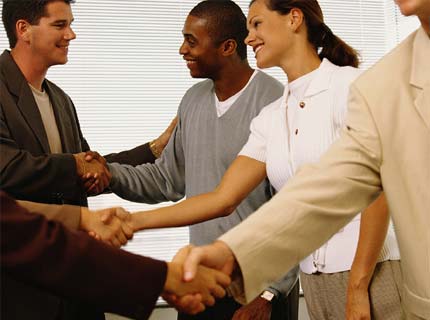How to Make Networking Events Work for You
 Networking works best if it is done with "marketing aforethought." Here’s your game plan for an effective networking event.
Networking works best if it is done with "marketing aforethought." Here’s your game plan for an effective networking event.
Where to Go
The best meetings for networking are the ones your clients and referral sources go to. Every person in business belongs to a trade association. Simply ask your clients what meetings they go to and suggest you join them. At the meeting, have your client introduce you to others (who are prospective clients). If anyone asks what you’re doing there, tell them you want to learn the industry better, to meet people and to ask questions.
Bar association meetings can be a great source for referrals – if you’re a litigator and you attend bar meetings to meet transactional lawyers, or you can meet out-of-state lawyers who may call you when they have a matter in your city.
Making a Plan of Action
Most people erroneously think networking is shaking as many hands as possible and spreading out as many business cards as possible at an event. This is incorrect. You should go to an event with the aim of having one or two meaningful conversations – that’s it.
A premeditated networker going to an event checks the membership or attendee list ahead of time, and highlights 3-5 people to meet. That way he’s not walking into a huge room full of people he doesn’t know. At the event, the networker asks the president to introduce him to a few of these targets.
Additional Tips
- Come early to meetings and stand by the table where nametags are handed out. Let everyone at the meeting see you are there. Say hello to everyone you know.
- Have the staff working the desk identify the people you are looking for.
- Pick out whom you're going to sit with and put your purse/jacket across the chairs at the table.
- Introduce yourself to the speakers and get their business cards; briefly chat them up about the topic they're speaking on. Do this at the front of the room so everybody can see you attended the meeting.
- If possible, bring a second person from your law firm to the meeting and have them do the same thing; be certain that you split up from the second person and sit at separate tables and talk to different people.




Larry:
Excellent advice. Sounds as though you've done this before.
I'd underscore the importance of being well-prepped. This is especially true when you're expected to network at a trade show or conference.
I remind my clients that most professionals—especially attorneys—have a touch of perfectionism. Use that to your advantage.
Put together a "study guide" for them. Offer some background. Tell them what's going on and why. Detail why the firm believes this is a good investment.
Give them the sample ice-breakers. (For example: "Which break-out sessions did you attend?" And then, "Why these?" or, "Learn anything?" Offer a bibliography. Make sure they know you're there to support them.
Having something like this in writing will let them prepare for the test they believe they're about to get. And, they associate being well-prepared with getting an "A."
The rest of what I recommend is in an article I wrote for MarketingProfs.com, "Tradeshow Tips for the Introvert." Check it out at http://xrl.us/TradeshowTipsForTheIntrovert.
DOUG
It's also important that, when you talk to these three to five people, you focus on their needs and not on broadcasting what you do. Learn as much as you can about them first, and then, if it fits into the conversation, tell them how you can help them.
A simple networking technique I've found useful is to employ the art of active listening in that you ask open-ended questions to keep your fellow networker talking (about her and her business). When you move on (in about 5-7 minutes),she will think you are the most interesting person in the room.